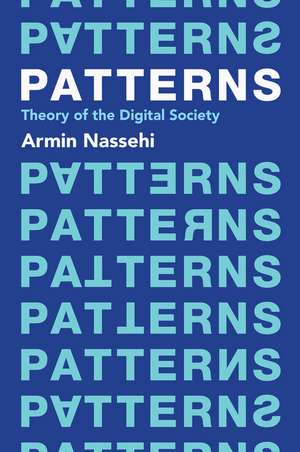Patterns – Theory of the Digital Society
Autor Nassehien Limba Engleză Paperback – 9 mai 2024
| Toate formatele și edițiile | Preț | Express |
|---|---|---|
| Paperback (1) | 129.99 lei 3-5 săpt. | +14.68 lei 10-14 zile |
| Polity Press – 9 mai 2024 | 129.99 lei 3-5 săpt. | +14.68 lei 10-14 zile |
| Hardback (1) | 397.24 lei 3-5 săpt. | +24.17 lei 10-14 zile |
| Polity Press – 9 mai 2024 | 397.24 lei 3-5 săpt. | +24.17 lei 10-14 zile |
Preț: 129.99 lei
Preț vechi: 162.49 lei
-20% Nou
Puncte Express: 195
Preț estimativ în valută:
24.87€ • 26.04$ • 20.58£
24.87€ • 26.04$ • 20.58£
Carte disponibilă
Livrare economică 15-29 martie
Livrare express 04-08 martie pentru 24.67 lei
Preluare comenzi: 021 569.72.76
Specificații
ISBN-13: 9781509558223
ISBN-10: 1509558225
Pagini: 268
Dimensiuni: 152 x 229 x 9 mm
Greutate: 0.42 kg
Editura: Polity Press
Locul publicării:Chichester, United Kingdom
ISBN-10: 1509558225
Pagini: 268
Dimensiuni: 152 x 229 x 9 mm
Greutate: 0.42 kg
Editura: Polity Press
Locul publicării:Chichester, United Kingdom
Notă biografică
Armin Nassehi is Professor of Sociology at the Ludwig Maximilian University of Munich.
Cuprins
Preface to the English Edition Preface Introduction How to think about digitalisation? A technological-sociological kind of intuition Early technology pushes Original and copy Productive wrong and predetermined breaking point 1 The Reference Problem of Digitalisation Functionalist questions Connecting data - offline What is the problem? The uneasiness with the digital culture The digital discovery of `society¿ Empirical social research as the identification of patterns `Society¿ as digitalisation material The cyborg as a means of overcoming society? 2 The Idiosyncracy of the Digital The inexact exactness of the world The particular idiosyncracy of data Cybernetics and the feedback of information The digitalisation of communication The dynamic of closure The self-referentiality of the world of data 3 Multiple Duplications of the World Data as observers Duplications Disturbances Transverse data-like duplications The trace of the trace and discrete duplications Traces, Patterns, Networks 4 Simplicity and Multiplicity Medium and form Coding and programming The digital simplicity of society Increased options Sapere aude as it is reflected in digitalisation Excursus: Digital Metabolism 5 Functioning Technology The function of the technological Digital technology Communicating technology The function of functioning Low-level technology Demonised technology Invisible technology and the Turing test The privilege of making mistakes 6 Learning Technology Decisions Abductive machines? Distributed intelligence? Anthropological and technological questions Experiencing and acting machines Incompleteness, temporariness, systemic paradoxes Artificial, bodily, incomplete intelligence 7 The Internet as a Mass Media Surplus of meaning deals Synchronisation function Synchronisation and socialisation Selectivity, mediality and voice in the Internet Watching the watching Complexity and overheating The Internet as an archive of all kinds of statements Intelligence in the mode of Future perfect 8 Endangered Privacy The improbability of informational self-determination A new structural change of the public? Hazards Privacy 10 Privacy 10 as a result of Big Data? Big Data and privacy 20 Rescuing privacy? 9 Debug: Sociology Reborn from the Spirit of Digitalisation Digital dynamic and social complexity An opportunity for sociology Notes Index
